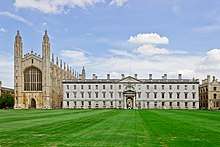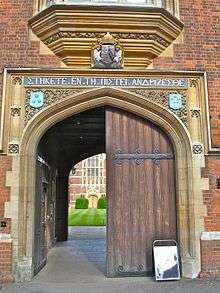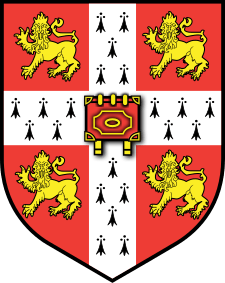Gates Cambridge Scholarship
The Gates Cambridge Scholarships were established in October 2000 by the Bill and Melinda Gates Foundation with a $210 million donation to support outstanding graduate students from all around the world to study at the University of Cambridge.[1] The scholarships are the University's most prestigious programme for postgraduate students[2] and the gift remains the largest single donation to a British university in history.[3] Each scholarship covers the full cost of a postgraduate degree in any subject at the University of Cambridge and includes a range of discretionary funding for academic and professional development.

The Gates Cambridge Scholarships are very similar in structure to Oxford University's Rhodes Scholarships, although the Gates Scholarships are awarded through a more centralized process and have a larger endowment. Their duration is also more flexible, as the Rhodes and Marshall Scholarships generally only last for two years (in some cases, up to three). Similar to the Rhodes Scholarship, the international Gates Scholarships are far more competitive than most American scholarships (in 2017 1.1% of roughly 5,000 applicants for the Gates).[4]
The first Scholars arrived at Cambridge in October 2001 and between then and 2019 more than 1,800 individuals from over 110 countries have been awarded the scholarship[5]. There are more than 200 Gates Cambridge Scholars studying at Cambridge at any one time.[6] Scholars have access to the Scholars Room located in University Center and contribute to many elements, activities and communities at Cambridge.
Eligibility and selection criteria
Applicants from any country other than the United Kingdom are eligible to apply for the Gates Cambridge Scholarships. Candidates must apply to pursue one of the following full-time residential degrees at the University of Cambridge:
- Doctor of Philosophy (PhD)
- Master of Science (MSc), Master of Letters (MLitt), Master of Philosophy (MPhil)
- Other one-year postgraduate course (e.g. LLM, MRes, MASt)
Applicants concurrently apply to a course, college and department and the offer of a Gates Cambridge Scholarship is conditional on the student gaining full placement in each.
The Gates Cambridge Trustees use four criteria to choose Scholars-Elect:
- Academic excellence: Competitiveness is evaluated through academic transcripts, references, experience and the potential to succeed on the chosen course. A departmental nomination is crucial for demonstrating this criterion,
- Choice of course: The Trust seeks Scholars who will have an academically transformative experience at Cambridge. Candidates must demonstrate intellectual superiority and the necessary skills and expertise to complete the course which they have chosen,
- A commitment to improving the lives of others: A defining characteristic of Scholars is their deep devotion to improving lives of others as evident by their past, current and future commitment to the societies in which they will live and work,
- and a capacity for leadership: Candidates must show exceptional leadership elements and a pledge to ‘take others with them’ as future leaders of their fields and communities.[7]

Generally, each class of Gates Cambridge Scholars is composed of 2⁄3 PhD and 1⁄3 one-year Scholars. The Gates Cambridge Trust uses a three-stage selection process to select its Scholars. The application process begins with prospective students applying to study for an eligible degree at the University of Cambridge, either during the U.S. or the global round. Following the initial application, each academic department at the University of Cambridge ranks and nominates eligible applicants for the scholarship. Departmental nominees are the most academically outstanding applicants for postgraduate studies in the department who wish to be considered for the Gates Cambridge Scholarship. The list of departmental nominees is then forwarded to the Gates Cambridge Trust, where it is divided into broad subject areas and passed to the Shortlisting Committees. Each Committee reviews the entirety of a departmental nominee and applies the Gates Cambridge selection criteria to shortlist applicants for interview. All shortlisted candidates are interviewed to assess how they meet all Gates Cambridge criteria and Scholars-Elect are selected only after the interview. [8] In 2018, 92 Scholars were selected from a pool of more than 5,500 applicants. [9]
Goals
The aim of the Gates Cambridge programme is to build a global network of future leaders committed to improving the lives of others. Scholars and alumni are already becoming leaders in their fields and contributing to finding solutions to some of the world's most pressing problems.
Gates Cambridge Scholars organizations
In 2002, Gates Cambridge Scholars organized and elected a student committee titled "The Gates Scholars' Council".[10] The Council aims to represent the Gates Scholars at Cambridge and to build a scholar community interwoven into the fabric of the university. In cooperation with the Gates Cambridge Trust, the university and various academic and professional organizations, the Scholars' Council organizes a number of academic, social and professional events that have distinguished and built the reputation of the Gates Scholars at Cambridge University. The scholarship is particularly known for its strong academic and social community at Cambridge.
In 2005, the Scholars once again self-organized to create the Gates Scholars Alumni Association,[11] which aims to build upon the friendships and contacts that were first made at Cambridge and to bridge the gap between the different generations of scholars. It is an active and growing organization, with members dispersed all over the world.
Controversies
Criticism of the Bill and Melinda Gates Foundation
In 2015, Gates Cambridge Scholars and Alumni forwarded an open letter to the Trustees of the Bill and Melinda Gates Foundation urging the non-profit philanthropic organization to divest from fossil fuels. [12] Following additional divestment calls by environmental activist groups, the Foundation significantly scaled back its investments in non-renewable energy sources in 2016. [13]
Following the controversial decision by Narendra Modi's government to withdraw the special status given to the disputed territory of Jammu and Kashmir, [14] more than 100 Gates Cambridge Scholars and Alumni signed an open letter condemning the Foundation's decision to award PM Modi the Global Goalkeeper Award for 2019. [15] Despite such condemnations, the Foundation awarded the recognition to PM Modi for the Swachh Bharat Mission[16] and "... the progress India has made in providing safe sanitation under his leadership"[17] during its third annual Goalkeepers event in New York City.
Notable scholars
| Name | University | Cambridge College |
Year | Nationality | Field |
|---|---|---|---|---|---|
| Kayla Barron | US Naval Academy | Peterhouse | 2010 | NASA astronaut | |
| Eric Cervini | Harvard University | King's | 2015 | historian | |
| Molly Crockett | UCLA | King's | 2006 | neuroscientist | |
| Johanna Hanink | University of Michigan | Queens' | 2006 | classicist | |
| Juliet Lapidos | Yale University | Hughes Hall | 2005 | journalist and author | |
| Kate Marvel | UC Berkeley | Trinity | 2003 | climate scientist and science writer | |
| Kamalini Mukherji | Jadavpur University | St. John's | 2002 | vocalist | |
| Greg Nance | University of Chicago | Fitzwilliam | 2011 | ultramarathon runner and entrepreneur | |
| Jaya Savige | University of Queensland | Christ's | 2008 | poet | |
| Robyn Scott | University of Auckland | St Catharine's College | 2004 | entrepreneur and writer | |
| Jay Silver | Georgia Tech | Churchill | 2002 | toy inventor | |
| Tara Westover | BYU | Trinity | 2008 | writer and memoirist | |
| Melanie Wood | Duke University | Trinity | 2003 | mathematician | |
| Yeo Bee Yin | Universiti Teknologi Petronas | Corpus Christi | 2009 | politician | |
See also
- Rhodes Scholarship at Oxford University
- Yenching Scholarship at Peking University
- Schwarzman Scholarship at Tsinghua University
- Marshall Scholarship for any university in the United Kingdom
- Mitchell Scholarship for any university in the Republic of Ireland
- Knight-Hennessy Scholars at Stanford University
- Jardine Scholarship at University of Oxford and University of Cambridge
References
- McCormack, Steve (9 March 2006). "Gates opening for the leaders of tomorrow". The Independent. Archived from the original on 12 August 2007. Retrieved 2008-10-02.
- "7 Indians selected for Gates Cambridge Scholarship". Hindustan Times. 2018-04-12. Retrieved 2019-01-31.
- Garner, Mandy (2018-04-12). "Introducing the Gates Cambridge Class of 2018". University of Cambridge. Retrieved 2019-10-18.
- "The Programme". Gates Cambridge.
- mandy (7 April 2017). "Gates Cambridge Class of 2017 announced". Gates Cambridge. Retrieved 2 March 2019.
- jim.smith (2018-08-16). "The programme". Gates Cambridge. Retrieved 2019-09-19.
- Garner, Mandy (2018-08-16). "The programme". Gates Cambridge. Retrieved 2019-10-18.
- jim.smith (2018-08-16). "Apply overview". Gates Cambridge. Retrieved 2019-09-19.
- Gates Cambridge (2014-10-19). "How we select". Gates Cambridge. Retrieved 2019-10-27.
- Garner, Mandy (2018-04-10). "Gates Cambridge Class of 2018 announced". Gates Cambridge. Retrieved 2019-10-27.
- The Gates Scholars' Council
- Gates Scholars Alumni Association
- "An Open Letter from Gates Cambridge Scholars to the Gates Foundation to Divest in Fossil Fuels". HuffPost UK. 2015-12-07. Retrieved 2019-10-27.
- Doughton, Sandi (2015-11-16). "Gates Foundation cuts fossil fuel investments — but why?". The Seattle Times. Retrieved 2019-10-27.
- Raj, Suhasini; Gettleman, Jeffrey (2019-09-15). "Abused by Soldiers and Militants, Kashmiris Face Dangers in Daily Life". The New York Times. ISSN 0362-4331. Retrieved 2019-10-27.
- Bayliss, Chloe. "Cambridge Gates scholars condemn Bill & Melinda Gates Foundation award to India PM Narendra Modi". Varsity Online. Retrieved 2019-10-27.
- "PM Modi receives Global Goalkeeper award for Swachh Bharat Abhiyan, says people in India behind its success". India Today. Ist. Retrieved 2019-10-27.
- Foundation, Gates (2019-09-24). "Prime Minister Narendra Modi received the Global Goalkeeper Award at tonight's Goalkeepers Global Goals Awards. This award recognizes the progress India has made in providing safe sanitation under his leadership.pic.twitter.com/QSMD4UqxiU". @gatesfoundation. Retrieved 2019-10-27.
